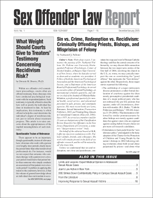Transient Sex Offenders and Residence Restrictions
Author: Jill S. Levenson, Ph.D..; Alissa R. Ackerman.; Kelly M. Socia, Ph.D..; Andrew J. Harris.
Source: Volume 16, Number 01, December/January 2015 , pp.3-6(4)

< previous article |next article > |return to table of contents
Abstract:
Sex offender residence restriction (SORR) laws prohibit registered sex offenders from living within close proximity (usually 1,000 to 2,500 feet) of places where children congregate. SORR laws are popular with the public but have had some serious (and not entirely unexpected) collateral consequences, including an increase in homeless among convicted sex offenders. This article closely examines the findings from a study in Florida that sought to identify whether and how SORR laws might contribute to sex offender transience. The authors conclude that SORR laws, as currently implemented, do indeed lead to highly unstable conditions for convicted sex offenders, and they propose alternatives that may accomplish the goals of existing SORR statutes without the destabilizing side effects that actually lead to greater recidivism.Keywords: Group Comparisons; bus stop restrictions; transients failure to register; offender supervision compromised by transience increasing risk factors associated with recidivism; not sanctioned for therapy payment by Medical Assistance or Medicare.
Affiliations:
1: Barry University; 2: University of Washington; 3: University of Massachusetts; 4: University of Massachusetts.